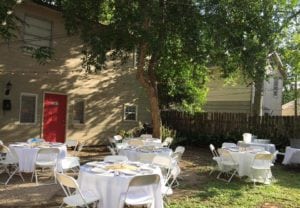
This week’s blog post is from Meredith Mills, a 2015 Hatch-a-thon participant who started a great ministry called gastrochurch based in Houston, Texas. She was kind enough to write a post that talks about her experience with a non-traditional ministry in the midst of Hurricane Harvey.
Gastrochurch is not a normal church. We don’t have a building. We don’t meet on Sundays, or even every week. And we don’t really have “members.” We are a community of church members and church-haters, deeply Christian and nominally Christian, left, right, and everything in between. The only thing committed gastrochurch people have in common with each other is a desire to connect, to talk about their souls on a level deeper than small talk. (That’s actually one of our hashtags…#smalltalksucks.)
So when Harvey struck Houston, I felt more than a little guilty that I wasn’t with one of the traditional churches shouldering the burden of the rescue and recovery efforts. Colleagues of mine were literally rescued from their roofs by helicopter, and then spent weeks on end just trying to get their heads above water as we all to wrap our heads around the extent of this catastrophe. Everyone had a neighbor who needed help; everyone had a homeless friend; everyone knew someone who lost everything. Even now, a couple months later, there are still people living in tents in their backyards. The piles of trash on sidewalks are noticeably smaller, but they are still there. “Normal” is redefined, and still a long way off.
Gastrochurch folks worked their tails off like the rest of the city. Those who are members of local churches worked alongside those congregations to run shelters and distribute supplies. Others spent days mucking and gutting neighbors’ (or their own) houses. When we finally had a gathering two weeks after Harvey, everyone was exhausted.
Gastrochurch gatherings take place in the evening, over a meal. It feels a bit like a pop-up restaurant. We bring tables with real tablecloths and real plates, put candles on the tables, and pray for each person before they arrive. Our core value—the one that outweighs all others—is hospitality.
Every evening has a theme, which guides the menu, the reflections, and—most importantly—the table conversation. When Harvey hit, we scrapped all previous plans and chose a new theme: comfort food. We wanted to allow people a chance to find some spiritual and physical comfort while processing their feelings, experiences, questions, and grief.
The gatherings go like this: people sit in tables of about six. They get three courses of a meal, served family-style. With each course, I give a brief reflection, leading up to a discussion question for the table. The questions are all intentionally probing. (Remember, #smalltalksucks.) The meal and conversation take about an hour and a half, and then we close with an optional time of communion and prayer.
The first discussion question was simply to tell their Harvey story. Some had seen their homes destroyed. Some had the survivor’s guilt of sitting in an air-conditioned apartment for a four days binge-watching Netflix because they couldn’t leave their homes. Some had been out of town and spent the four days glued to the television, drowning in their own feelings of helplessness.
The second question was intended to deepen the conversation. I talked about Job, and the universal human experience of undergoing suffering that is in no way your fault. There are always, it seems, terrible friends offering terrible spiritual advice. (“God won’t give you more than you can handle!”) And there is also the desire—probably universally rooted in the human heart—to demand answers. We want meaning. We want God to explain why this happened. We may even want God to answer for seeming crimes against humanity. And so, the second question was this: “If you could ask God anything you wanted about this crisis or any other, what would it be?”
People began to open up in different ways. Some talked about how guilty and helpless they felt not having any damage themselves. Some talked about how inspired they were by how the community responded, that it was the first time they felt truly proud of Houston. One person said he just wanted to know if there was a reason behind all of it. Did God do this to bring people together? Or does God have a reason for disasters like this? Or is God even directly responsible? Another person said he realized it was the first time in his life he didn’t have a question for God: “This whole experience has been about moving from a place of demanding answers to a place of trust. I’m not questioning anymore.”
One participant told me that everyone at her table had the same question: why me? Either why did my house get flooded? Or why was I fine while my neighbors a block away were devastated? She said, “Everyone’s relationship with God is so personal, and they all bring it to the table. Everyone’s got to figure that relationship out for themselves. Nobody can come and fix it for them.”
The final question moved toward the question of resolution. I remarked that Job never gets answers, he gets experience. He gets an overpowering experience of the presence of God, one that is remarkably reminiscent of a powerful storm. And somehow that experience of the presence of God changes him. Even before he gets everything restored, Job comes to a place where his soul is quieted because he has seen God. Final question: “What would a resolution to your suffering look like?”
I hadn’t thought of it at the time, but the final point summarizes what gastrochurch is all about. People don’t usually get answers, they get an experience. They get to share a part of their souls, and hear a part of someone else’s. Some people stay with the questions, others don’t. We don’t have strict rules, just an invitation to talk about something more meaningful than the weather. Each table takes its own journey, and two tables rarely journey in the same direction. Our theory is that most people are looking for something far deeper than answers anyway.
As the evening drew to a close, I invited all who chose to join me inside for prayer and communion. We usually share communion in silence, but tonight someone had shown up with a guitar. We passed bread and wine around the room while singing—whether truthfully or not—it is well, it is well with my soul. When the time came to leave, I held up my hands for the final blessing:
May you go in
May you go in
May you go in love.
May you go with trust that you are not alone.
May you go with the faith that God is good.
May you go with knowing that while it is utterly false that everything on earth is alright,
it is entirely true that one day all things shall be made well.
May you go with the hope of the eternal sunrise ever before you
May you go with the courage of God’s hospitality within you
May you go with irrational peace of Christ around you
In the name of the Father, Son, and Holy Spirit. Amen.
Hungry for more? Sign up for our newsletter and stay up to date on our latest blogs and Ministry Incubators news!




Please sign me up for your newsletter.